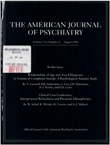Comparative efficacy of selective serotonin reuptake inhibitors and tricyclics in the treatment of melancholia
Abstract
OBJECTIVE: The popularity of selective serotonin reuptake inhibitors stems from their apparent efficacy for numerous disorders and their favorable side effect profile. However, several studies have suggested that selective serotonin reuptake inhibitors may be relatively ineffective for treating melancholia. The objective of this study was to compare the responses to fluoxetine and nortriptyline of older patients with both severe depression and heart disease. METHOD: The outcome of 22 hospitalized patients with unipolar depression and heart disease who were treated with fluoxetine was compared to the outcome of 42 comparable patients treated with nortriptyline. The average age of the fluoxetine group was 73 years, and their mean pretreatment score on the Hamilton Depression Rating Scale was 26; the average age of the nortriptyline group was 70, and their mean pretreatment Hamilton score was 28. RESULTS: Of the 42 nortriptyline-treated patients, 28 were responders, six were nonresponders, and eight dropped out. The intent- to-treat response rate was 67% (28 of 42), and the response rate of the melancholic patients who completed the nortriptyline trial was 83% (20 of 24). Of the 22 fluoxetine-treated patients, five were responders, 13 were nonresponders, and four dropped out. The intent-to-treat response rate was 23% (five of 22), and the response rate of the melancholic patients who completed the fluoxetine trial was 10% (one of 10). CONCLUSIONS: Fluoxetine appears to be significantly less effective than nortriptyline for treating hospitalized elderly patients with unipolar major affective disorder, especially those with the melancholic subtype and concurrent cardiovascular disease.
Access content
To read the fulltext, please use one of the options below to sign in or purchase access.- Personal login
- Institutional Login
- Sign in via OpenAthens
- Register for access
-
Please login/register if you wish to pair your device and check access availability.
Not a subscriber?
PsychiatryOnline subscription options offer access to the DSM-5 library, books, journals, CME, and patient resources. This all-in-one virtual library provides psychiatrists and mental health professionals with key resources for diagnosis, treatment, research, and professional development.
Need more help? PsychiatryOnline Customer Service may be reached by emailing [email protected] or by calling 800-368-5777 (in the U.S.) or 703-907-7322 (outside the U.S.).



